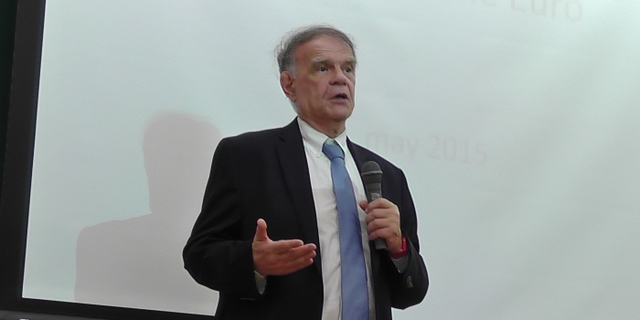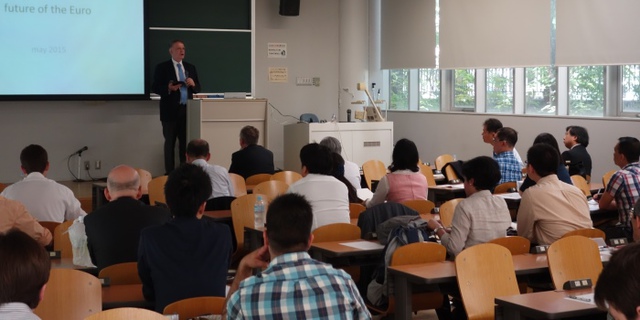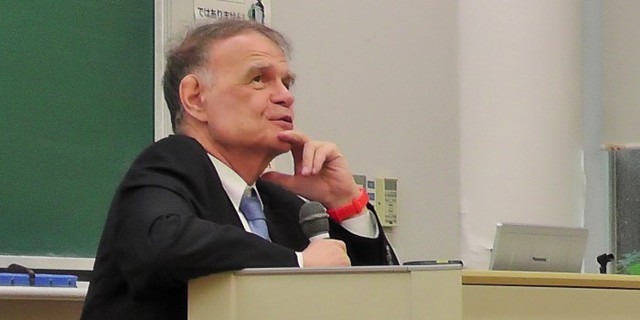The 81st Public Policy Seminar
The Future of the Euro—Needed analysis, not politics—
by Dean Jean-Pierre Landau
The School of Public Affairs, SciencesPo (Paris)
Former Deputy Governor of the Banque de France
第81回公共政策セミナー
The Future of the Euro—Needed analysis, not politics—
by Dean Jean-Pierre Landau
The School of Public Affairs, SciencesPo (Paris)
Former Deputy Governor of the Banque de France
| Date & Time: | Friday, May 15, 2015 10:00-11:40 |
|---|---|
| Venue: | Room 101, School of Law Bldg., Hongo Campus, The University of Tokyo |
| Language: | English |
| 日時: | 2015年5月15日(金) 10:00-11:40 |
|---|---|
| 場所: | 東京大学本郷キャンパス 法学政治学系総合教育棟101教室 |
| 共催: | The School of Public Affairs, SciencesPo (Paris) 東京大学公共政策大学院 |
| 言語: | 英語 |

Summary
The global financial crisis that had hit all major advanced economies left a legacy of debt, problems and slow growth in Eurozone which they are still dealing with. Since Eurozone was a new creation, not complete or robust enough to resist the crisis it was hit the hardest.
The honorable speaker outlined six major points regarding the present as well as the future scenario of Euro and Eurozone at large.
-
There is an uncertain scenario as far as Eurozone is concerned. There are questions that must be answered and problems that must be solved.
- Most immediate question is on Greece; whether it could reach an agreement with the rest of the Eurozone members and whether such an agreement would be able to consolidate the Greek debt.
- Second concern is about growth. There has been a resumption of growth compared to the previous 4 years. Yet the growth (1.5-1.6%) is insufficient compared to the favorable financial conditions such as low prices/inflation, lower interest rates and depreciated Euro.
- The third concern is with respect to the nature of the Euro Social Compact, given the background of impending referendum in UK and presence of secessional voices in France.
Huge national debts of poorer Southern countries has evoked questions pertaining to redistribution issues across member nations furnacing politics of resentment, especially among the citizens of richer North as they feel that they are bearing the losses for which they were not responsible.
-
The question whether Eurozone makes an economical sense or is it a purely political project has reemerged and it needs to be answered because if it is a purely political project, it could fail out of political impasse.
Most of the Anglo-Saxon economists opine that Eurozone do not make economic sense and their argument is based on theory of Optimum Currency Areas. According to the theory, if you don’t have exchange rate flexibility, that is; if you have a single currency area there shall be either full factor mobility or fiscal federalism for the monetary union to exist successfully. Since Eurozone neither has full factor mobility—due to rigidities in labor market—nor fiscal federalism Eurozone experiment is bound to fail, according to them.
However many including the speaker do not share the view because:
- a single currency brought internal financial stability in the aftermath of global financial crisis. If there had been different national currencies there would have been big swings in exchange rates creating enormous tensions in the integrated single market of the Eurozone;
- a single currency promotes efficient allocation of resources. In the Eurozone capital was flowing from North to South—from richer to relatively poorer countries—unlike in the rest of the world. Economic convergence was faster in the Eurozone due to monetary union and resultant capital market integration.
However the Eurozone enthusiasts could foresee neither the volatility of cross-border capital flows during a crisis nor the impact of links between banks and national governments. ECB had to step in as capital flows deteriorated during the crisis while crisis was aggravated due to strong links between banks and governments since banks stayed national and held huge portions of public debt.
There has been asymmetry in institutional framework which led to semi-parallelizing of emergency response mechanism.
When the crisis was unfolding, getting consensus on policy initiatives and actions from different national governments was difficult. The second pillar of asymmetry was between ECB and national governments as ECB took on its shoulder a lot of the burden of crisis management including liquidity injection and conditionality.
There has been a lack of convergence across governments on how to deal with debt scenarios and regarding appropriate fiscal and monetary policy mix.
The differing views emerged in the backdrop of interest rates spike in Spain was quoted as an example. While some regarded it as the reflection of solvency problem others viewed it as liquidity trouble (rather than solvency) and argued the issue could be resolved if ECB acts along the lines of Bank of England—which averted similar trouble in UK.
Given the backdrop of ongoing debates regarding the role of monetary policy and sharing of fiscal responsibility in a monetary union, the speaker argued that the sustainability of the debt of a member nation in Eurozone typically depends on the state of the world which in turn is contingent upon some amount of fiscal integration among the Eurozone countries such as a banking union.
The member nations shall share resources in order to make the common policies work. Reluctances (against such resource allocation and redistribution) emanated in the context of recent crisis shall be resolved for attaining better fiscal nexus and for the efficient and successful operation of the monetary union.
The speaker concluded the enlightening interaction pointing out that the success of Eurozone experiment is never a ‘yes or no’ affair rather it depends upon attainment of progress towards better fiscal integration and improved factor mobility.



Related Resources
-
Personal Website
-
PDF, 701KB